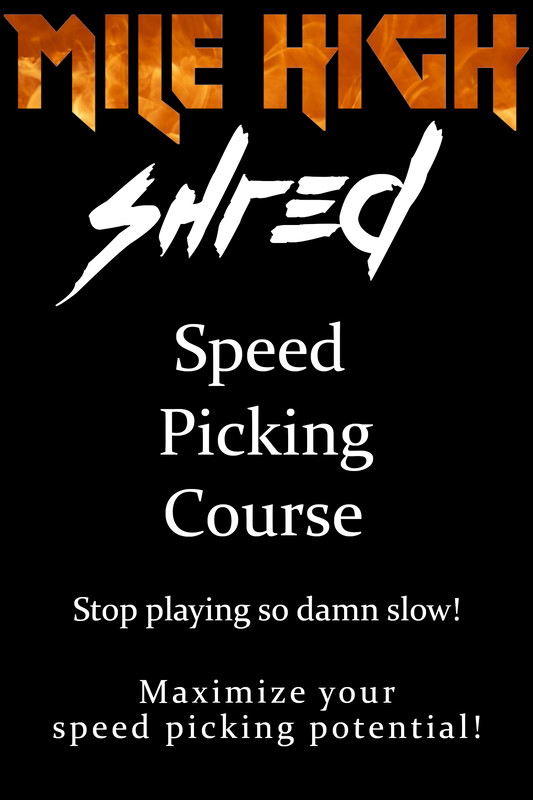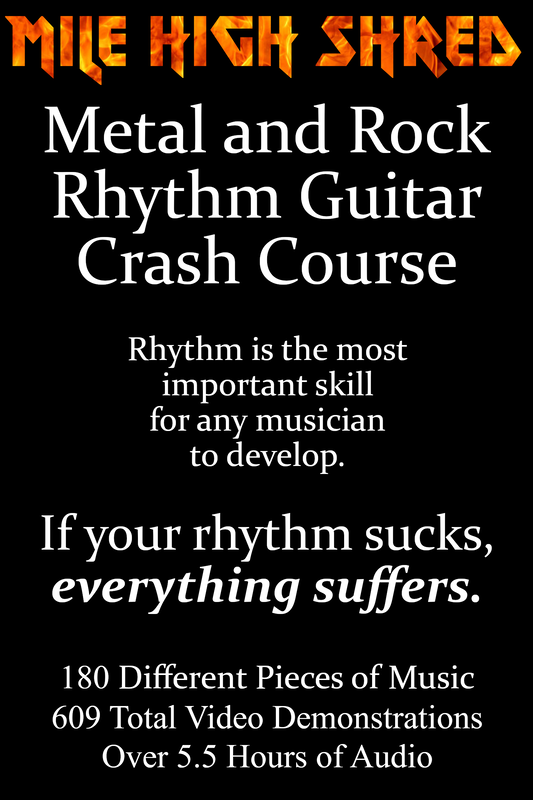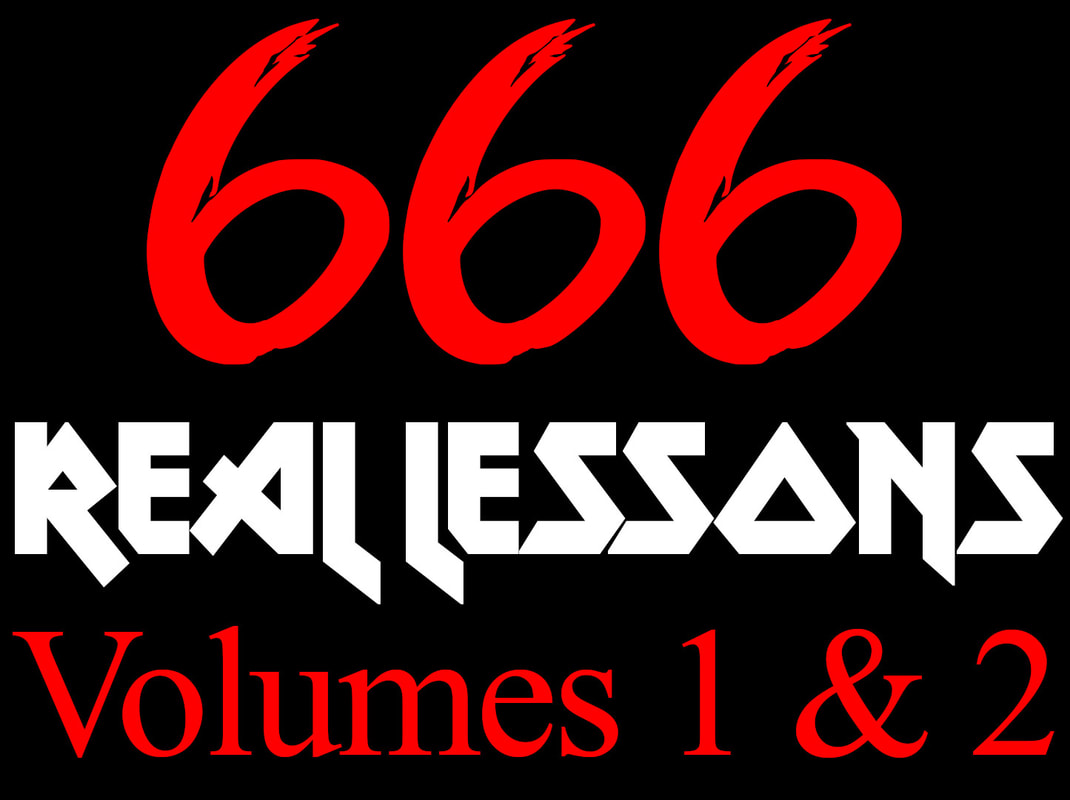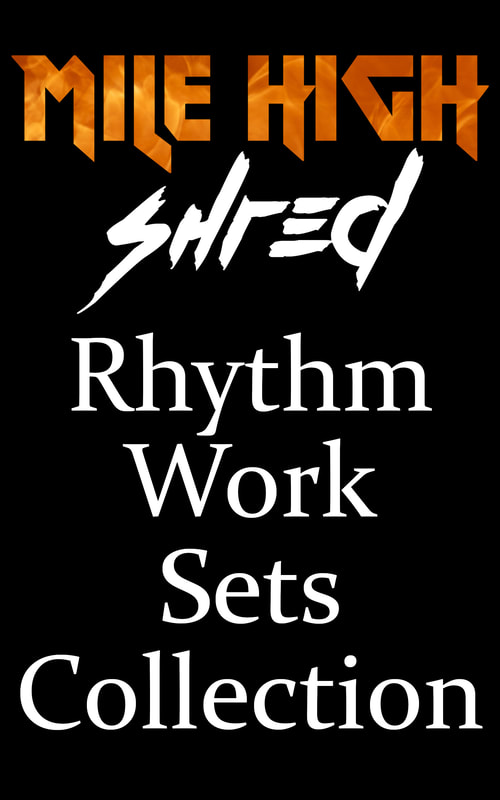|
Watched a video made by Rick Beato where he goes over guitar practice ideas. This video is the edited live stream where Beato's ideas were checked out!
Here is Rick's original video: https://youtu.be/CxtgJynvDlU
0 Comments
Yes, I highly recommend practicing with a metronome.
When used properly, the metronome can make you far faster than you currently are. You may even get faster than you thought was possible! When people tell me they can't get faster at something, and that they DO use a metronome for practice, something just seems wrong to me. And, whenever they tell me how they are approaching their metronome practice, it turns out they're approaching their practice incorrectly. Practice doesn't mean anything. Playing along with a metronome doesn't mean anything.
Only PERFECT practice delivers the results you want!!!
What does that mean?
Perfect practice means you play things correctly as you practice them. If you practice a scale with a bunch of mistakes, you're not getting better at playing the scale correctly. If you hit an incorrect note when running through your scale, you NEED to fix it IMMEDIATELY. Do NOT just keep playing. Hit the correct note, and then start your scale over again. Just because a metronome is on doesn't mean you'll get some kind of magical speed transference. You HAVE to use it CORRECTLY. Because this is a lesson on when metronome practice does NOT work, I won't be getting into details on how to use a metronome. However, the basic idea of using a metronome is to time your notes to be played when your metronome clicks. You could also aim to have 2 notes be played, evenly spaced, over the time of a click on your metronome. To do this, you will play a note when your metronome clicks, and then the second note directly in between the click you just played on and the upcoming click. It's best to start by lining up one note per click until you can actually hear when you're on or off with the metronome. When people use the metronome for the purpose of getting faster there are some common mistakes being made by a LOT of you. Here are some of the mistakes being made:
Some people, like Shawn Lane, never had to do a lot of metronome practice to get fast. I'm pretty sure you're not Shawn Lane. You're probably going to have to really work your ass off if you want to be blazing fast on guitar. But, you're in good company. Most of us have to put in time with the metronome. That's just the way it goes.
You can be a part of getting more lessons made. CLICK HERE to see how!
photo credit: Sarble <a href="http://www.flickr.com/photos/32014910@N00/2962901352">Tick Tock</a> via <a href="http://photopin.com">photopin</a> <a href="https://creativecommons.org/licenses/by-nc-sa/2.0/">(license)</a>
It's not easy learning new things. Whether it's a new instrument, new song, new solo, new scale, you name it - the first time you try it tends to be a challenge.
Why?
BECAUSE IT'S NEW!!!!!!!
We all have neural pathways that get better and stronger the more we practice something. At first, those pathways suck. They're weak! They need to be made stronger and stronger just like building a stronger bench.
It takes time.
It takes some patience. It takes practice practice practice PRACTICE HOURS OF PRACTICE PRACTICE, DAMMIT!!!!
STOP getting down on yourself just because you can't play something perfectly, or easily right away. If you have NEVER done something before it's unrealistic to expect yourself to be able to do this new thing right away.
As of this entry, I've been playing almost 20 years. I STILL come across things that kick my brain's ass because certain finger patterns or note choices are very foreign to me. That's fine. That's normal. And, if you plan on progressing as a musician as long as you can, it will happen to you too. OVER AND OVER AND OVER AGAIN! Now, learning new songs or solos, etc. may actually come very easy to you sometimes. Why? Because you have already played/learned enough similar material to where this new piece of music isn't really all that different in terms of motor skills and muscle memory. So, if you're one of those people who say things like, "but it shouldn't be this hard!", STOP IT!!!
You are setting unrealistic expectations for yourself. If something is hard then you simply have not performed that task enough times.
PERIOD
Now, here's a video to demonstrate this idea even further :)
A discussion I had with a student recently led me to think about certain aspects that go into becoming a proficient guitar player. So, just what is a realistic time frame for a guitarist to become really good on their instrument, or can you even give a time frame?
I've touched on this before, and mentioned how it comes down to how much time you put in. How you practice also makes a big difference. However, I'd like to mention some other things this time, and give some numbers so you can get a perspective of how many years it may take you to reach your goals, whatever those goals may be. For those of you who don't know, I'm very much into weight training, health and fitness. One goal I had when I got into lifting was to get as big as Arnold. I have recently learned about putting my goals into a more realistic perspective. Without taking performance enhancing drugs, I'll never be as big as Arnold, and I'm fine with that. Also, there's a really good chance Arnold, just like so many top level athletes, has fantastic genetics that allowed him to do what he did. Does that mean genetics can play a role in how well you can play and learn an instrument? Unfortunately, yes. Does that also mean you need to take steroids in order to play extremely well? Thankfully, no! So, when you begin comparing yourself to guitarists like Paul Gilbert and Steve Vai, you're basically comparing yourself to top level athletes. You're being unfair to yourself when you do this. We can't all have fingers that are 2 feet long! The only person you need to compare yourself to is yourself. Celebrate every small victory you make. If speed is your goal, and you can play 1 BPM faster in a day, or a week, that's still an accomplishment. I'm a big believer that as long as you practice correctly and put in enough time, you can basically do anything you want on your instrument. However, after teaching for several years now, a somewhat humbling conclusion has been made: Some people just "get it." Some people just seem born to play, and they learn very quickly. Some people have a very difficult time learning how to play, and even if they put in the right amount of effort and correct practice, they still won't be able to learn as fast as someone seemingly born to play. Have you seen any of these child prodigies on YouTube? You may have seen someone around 10 years old playing extremely difficult and technical songs like they've been playing for decades. These kids seem to have some kind of genetic advantage over the majority of players. Now, that doesn't mean they haven't practiced their butts off to get to where they are. You still need to practice, and put forth effort. In fact, maybe these kids just put in way more hours than we realize. That is something I believe is often overlooked. Just because someone has only been playing a few years doesn't mean that someone who's play for 20 years has spent more time with the instrument. I've had some people tell me I'm gifted at playing the guitar, and even the bass. Now, I don't know if this is true. I put in tons of work, especially in my first few years of playing. Now, my dad is a guitar player, and his dad a guitar player. Does that help me out in some way? Possibly. I really don't know. I would say there is a good chance though. Regardless, I still put in a lot of work, just like any of the guitar greats. (No, I'm not calling myself a guitar great.) 10,000 hours of practice is what it takes to become an expert at something. Well, at least that's what I've been told. I've also read that this idea has been debunked. But, let's just say it's true for the sake of making an example. If you're only practicing for 30 minutes a day, everyday for a year, that gives you about 182 hours of practice each year. It will take you 55 years to reach the mark of 10,000 hours. That's a pretty long time. If you're only putting that much practice time into your playing, than you can expect to be at it for a very long time before you become a proficient player. What about 60 minutes a day? That will give you about 365 hours for the year. You'll still have about 27.5 years to be super good. If you put in 2 hours of practice a day, you'll have put in about 730 hours for the year. Now you'll only have 14 years of practice and playing until you've hit that 10,000 hour mark. So, hopefully you see that the more practice you put in, the closer you get to becoming an expert, professional, etc. It's not about how many years you've been playing, but about how many hours you've actually put into learning your instrument. Genetic capability aside, nothing trumps hard work and dedication. Someone putting in the right kind of practice for the right period of time will always be better than the gifted musician who never practices and is lazy with their instrument. I completely understand how difficult it can be to get in a lot of practice time once you've hit good ol' adulthood. Working a full time job can be draining, and eat away at your energy to practice. Throw in having a family, and the job gets even harder. But, no excuse in the world is suddenly going to make you a better player. So save the excuses, and just accept the fact that you may have to take a lot longer at reaching your goals due to your life schedule. If you stay persistent you will get better. Make sure you are practicing properly and the correct material too. Practicing the wrong thing for 10,000 hours won't do anyone any good. If you can, get an instructor. It's what I did, and I'm truly grateful for it. Check out this video for more advice on this subject:
Are you looking how to master the guitar? Have you seen books claiming you can master the guitar by following the steps inside? Have you seen advertisements on how to "master the fretboard" and other such things?
Well, I have some news for you... You will NEVER master the guitar. NEVER! No one is ever going to master the guitar, bass, drums, or any other instrument for that matter. Why? Because saying you have mastered something, to me, means that you cannot possibly improve any further. You have reached the peak and achieved perfection. There isn't a single thing you can do to possibly make any kind of improvement. Everybody, no matter who they are or how long they've played, can always improve at something. I guarantee all the guitar greats you look up to will agree. Sure, plenty of those guitar greats are considered "masters". Guys like Steve Vai, Satriani, Paul Gilbert, etc. are so damn good at what they do that people consider them masters. That being said, there's still something all of them can work on and improve. I'm sure they would all agree. I've been playing for nearly 20 years and I still find things I can get better at. This will always be the case. Music is an ongoing journey with no end. No matter how many ways you've learned how to use various techniques there will always be something new to try. The possibilities in music are truly endless. Now, I didn't put this entry together to discourage anyone. I feel that it's important to know that anyone advertising that you can "master the guitar" is straight up lying to. It's complete and utter bullshit! Yes, there certainly can be things of value found in books that claim mastering, or things found online. However, they're using this claim as a gimmick to get you to buy their product. I think that's just wrong. So, as you continue on with your musical journey, I hope you will realize that looking to master your instrument is simply not the way. I hope you will have fun with music and continue to grow as a musician so you may express yourself musically in any way you wish.
|
Available Instruction Courses
|
- Metal and Rock Guitar Lessons
- Reach Your Fastest Speeds
-
Menu
- Skype Lessons
- Sign Up for Skype Guitar Lessons
- Video Correspondence Lessons
- Sign Up for Video Correspondence Lessons
- FREE Lessons for a WEEK >
- Free Tabs
- Get TWO FREE eBooks
- Rates
- Instruction Courses >
- Video Feedback Lessons
- Contact
- Blog (LOTS of Free Lessons)
- Student Testimonies
- Backing Tracks
- Store
IN DEPTH
|
|





 RSS Feed
RSS Feed